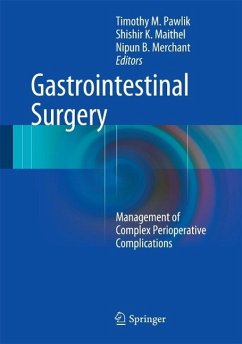While surgical management of thoracic, hepato-pancreato-biliary, and colorectal diseases continues to evolve, morbidity continues to be a persistent problem. This book provides a comprehensive, state-of-the art, definitive reference for the diagnosis and management of difficult-to-manage complications following advanced gastrointestinal surgery. All chapters are written by experts in their field and include the most up-to-date clinical information from national and world leaders in their respective disciplines. The text provides a practical, clinically useful guide that reviews risk factors for these complications and offers key information on how to avoid potentially high morbidity events in the peri-operative period. It also discusses the management of these problems when they do occur. With its helpful guidelines and "tricks of the trade" to avoid potential complications, this book is essential to all medical professions treating such patients.
Gastrointestinal Surgery: Management of Complex Perioperative Complications is of great value and utility for general surgeons, thoracic surgeons, upper gastrointestinal surgeons, colorectal surgeons, hepato-pancreato-biliary surgeons, surgical oncology fellows, thoracic surgery fellows and upper level residents in general surgery.¿
Gastrointestinal Surgery: Management of Complex Perioperative Complications is of great value and utility for general surgeons, thoracic surgeons, upper gastrointestinal surgeons, colorectal surgeons, hepato-pancreato-biliary surgeons, surgical oncology fellows, thoracic surgery fellows and upper level residents in general surgery.¿
Dieser Download kann aus rechtlichen Gründen nur mit Rechnungsadresse in A, B, BG, CY, CZ, D, DK, EW, E, FIN, F, GR, HR, H, IRL, I, LT, L, LR, M, NL, PL, P, R, S, SLO, SK ausgeliefert werden.
"The intended audience is practicing general surgeons and surgical oncologists, but the book also can be useful for residents and advanced surgical trainees. ... This is a good reference for general surgeons and cancer surgeons. It covers multiple pathological conditions seen during the postoperative period and provides useful information to guide clinical management decisions. The organizational scheme makes it easy to find detailed information about specific complications, tips on how to avoid them, and extensive suggestions on management." (Prashant Khullar, Doody's Book Reviews, April, 2016)









